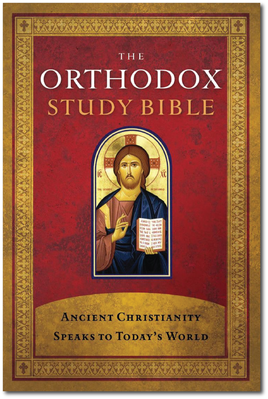 This past Spring, we released the Orthodox Study Bible for the Accordance Library [see original announcement here]. I have known Theron Mathis, one of the contributors, for nearly two decades. In the interview below, I asked him about his involvement in the project and what he considers significant about the Orthodox Study Bible for all readers of Scripture.
This past Spring, we released the Orthodox Study Bible for the Accordance Library [see original announcement here]. I have known Theron Mathis, one of the contributors, for nearly two decades. In the interview below, I asked him about his involvement in the project and what he considers significant about the Orthodox Study Bible for all readers of Scripture.
Theron, tell us a bit of your background and how you got involved with the Orthodox Study Bible project.
I have two Religion degrees: a BA from Liberty University, where I also minored in Greek, and an MDiv from the Southern Baptist Theological Seminary in Louisville. I got involved in the Orthodox Study Bible as a Baptist when I was exploring the Orthodox Church. After my wife and I had become catechumens in the church, I reached out to the organizers of the project and asked if I could participate. After checking credentials, I was assigned to translate 1 & 2 Samuel (1 & 2 Kingdoms) and write the study notes on the project.
Much like many modern translations, this is not a pure, from-the-ground-up translation. It is technically a revision of previous translation. Thomas Nelson was helping with the project, so we used the New King James Version as the base translation and corrected the text wherever it deviated from the LXX.
What are the more significant places where 1 & 2 Samuel/1 & 2 Kingdoms in the LXX differs from the Hebrew text?
We tried to make the Christological allusions more apparent where they occurred. An example of this is the use of “the Anointed.” Rather than translate it as Anointed or perhaps Messiah, we used the word Christ, which is really a transliteration of the Greek word for anointed [χριστός].
When reading Hannah’s prayer, there are some similarities in the Greek with Mary’s prayer in Luke 2. Because of this, we used the same English words the translators did in Luke 2, so the connection would be obvious.
There is much more detail and conversation in the challenge between David and Goliath. The Davidic covenant differences really stand out to me. This is found in 2 Samuel 7. The first major difference was in 7:13. The Hebrew uses the word establish [כּוּן] for the action God will take toward the Davidic line. The Greek that is used [ἀνορθόω] suggests that God is doing something again. Restore is the closest English we could find for this. Restore suggests a future action by God because of something that has happened to the Davidic line. This makes the prophetic nature of the passage much more clear.
In 7:14 the SAAS says, “And if he commits iniquity, I will chasten him with the rod of men…” This shows God’s protection of David’s lineage, and that he will not allow it to be fully corrupted, but will continue to make in line with righteousness through the chastening of other men if necessary. As the monarchy became more corrupt, the fulfillment of this by outside threats, including the Exile, are obvious. The Greek could have been translated differently to give future implications. An acceptable translation could have been “Whenever his injustice arrives, I will chasten with the rod of men and the blows of the sons of men.” This translation only makes sense in the light of Christ, who although righteous, suffered injustice at the hands of humanity.
How great of a challenge was it to prepare the study notes for these books? Did you discover that Orthodox understanding of these passages differed greatly from your previous Baptist background? What would you say stands out theologically or interpretively about 1 & 2 Samuel/1 & 2 Kingdoms from an Orthodox perspective?
I didn’t have the electronic tools we have today in doing research and had to spend many hours combing indexes of books to find instances where the Church Fathers may have commented on a passage. The searchable tools we have today would have made the research portion much easier.
When reading the Fathers on the Old Testament, they are constantly reading with an eye to Christ and the renewal that He brought to mankind. If Christ is the fulfillment of the Old Testament, then He can be found there; and it feels that they are on this quest as they read the Old Testament. This doesn’t mean they denied the literal or moral aspects of the text, but seeing Christ was first.
Alongside Christ, they see many NT realities that we might miss–from the person of Mary to the Church. For example, they often see the Ark of the Covenant as an image of Mary, who brought the presence of God into the world through bearing the person of Christ. So, connection is often made between David dancing before the Ark as well as the unborn John the Baptist “dancing” in the womb of Elizabeth when she meets the expectant Mary.
The continuity of liturgical worship from the Old Testament into the new was something I would not have seen before. Often words such as λειτουργία are translated as “ministry” or “service,” which might be acceptable; but you miss a sense of worship in those words. The same words used in Samuel’s ministry in the temple are the same words we often find in Paul’s letters when he is discussing worship.
Also, it was refreshing to find that the Fathers were not afraid of difficult passages. That strange story of the Witch of Endor was addressed by at least 14 different early theologians, to try to explain what was really going on with Samuel appearing at her command.
From your perspective as a contributor to the Orthodox Study Bible, what makes it unique besides the obvious Eastern Orthodox point of view?
-
It provides a very accessible entry into the Septuagint. Prior to the Orthodox Study Bible, there was only one English version of the LXX, which was originally published in 1844. It reads like the 1611 KJV, so the language can be a stumbling block for many people. Reading the LXX provides a glimpse into many of the New Testament writers’ use of language, and often explains a New Testament quotation that doesn’t quite fit right with the Hebrew Text. It is usually because it is being pulled out of the LXX.
-
Many of the study notes are direct quotations and commentary from the Church Fathers. In my experience most modern Christians are unaware of the thoughts and ideas of Christians prior to the 15th and 16th century. The Orthodox Study Bible can open up a whole new wonder of reading and understanding the Scripture.
-
There are more books of the Bible to read [the Apocrypha/Deuterocanon].
Do you believe Non-Orthodox readers would benefit from the Orthodox Study Bible? If so, how?
Yes. Translators do their best to be faithful to the original text, but ultimately translations are interpretations. Knowing this is why Christians will often read multiple versions of the Bible to help understand a passage. Reading the Orthodox Study Bible brings a different perspective that most Western Christians have rarely seen.

In a few words, these books provide a lot of moral instruction for Christians. Sirach itself feels like Proverbs on steroids. The early Church loved the Maccabean books because of their encouragement in the face of potential martyrdom. They also show a deeper understanding of God by Israel that leads smoothly into the person of Christ. I think this is often missed when we drop off 300 years of God’s actions among his people by stopping with Malachi.
Is there anything else about the Orthodox Study Bible that you would want to mention to Accordance users who might be discovering it for the first time?
Use this edition of the Bible as another tool to see a perspective on Scripture that may be slightly different than the standard Western approach. Even if you disagree with the Orthodox understanding, hopefully you will be challenged, and your faith will deepen as a result.

